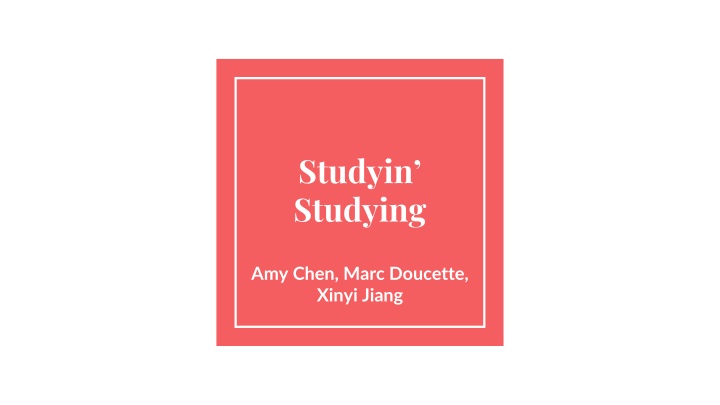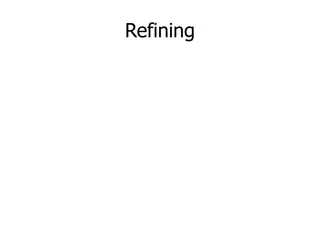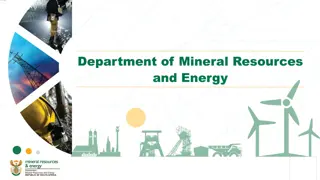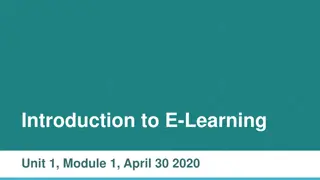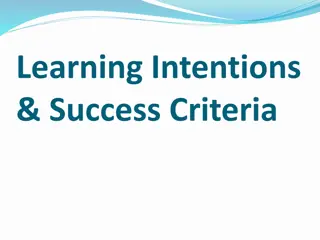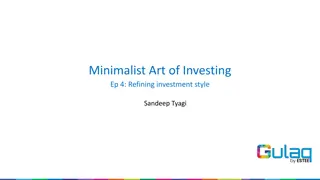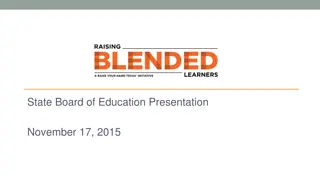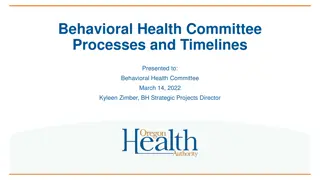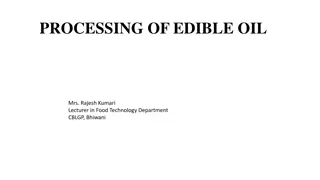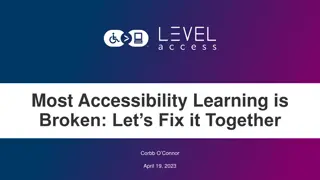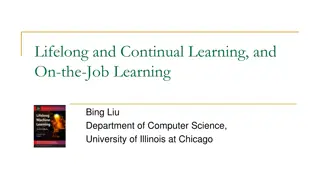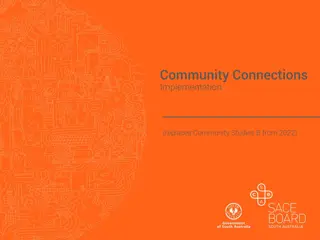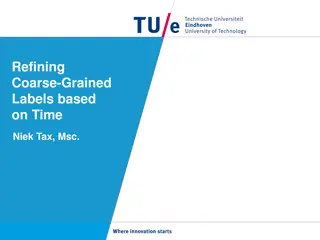Refining Education for Better Learning Support
Examine teaching and study habits to refine education for improved learning processes. This study involves interviewing students, recent graduates, and tutors to gather diverse perspectives on studying and teaching. Insights on class experiences, tutoring sessions, note-taking, material organization, test effectiveness, and more are shared. Understanding the impact of cultural context on learning, the importance of diverse subjects in education, and the role of practice exams in studying are key areas of focus.
Uploaded on Apr 12, 2025 | 2 Views
Download Presentation

Please find below an Image/Link to download the presentation.
The content on the website is provided AS IS for your information and personal use only. It may not be sold, licensed, or shared on other websites without obtaining consent from the author.If you encounter any issues during the download, it is possible that the publisher has removed the file from their server.
You are allowed to download the files provided on this website for personal or commercial use, subject to the condition that they are used lawfully. All files are the property of their respective owners.
The content on the website is provided AS IS for your information and personal use only. It may not be sold, licensed, or shared on other websites without obtaining consent from the author.
E N D
Presentation Transcript
Studyin Studying Amy Chen, Marc Doucette, Xinyi Jiang
METHODOLGY: Examine teaching and study habits and techniques, focusing on how to refine Education to better support the learning process.
WHO: 3 Interviewees: 1 student - Brian 1 recent grad grad - Nisha 1(.5) tutors - Alex
WHY: To gather different perspectives into how people study and help others study
HOW: Ask our friends and contacts in the Stanford community
STUDENTS TUTORS Tell me about a class you re in. Tell me a story from a tutoring session. How do you determine the most relevant topics to study in a class? ? What impact do you feel you had on your students What s your process for taking notes? For organizing materials you re given? work? What makes for an effective test / assignment?
1 2 3
Student, 18 studying English & Education Interviewed in his room on campus Aspiring schoolteacher. Tutors in everything relating to words Brian the student, 21
say think Homework is good but graded work requires feedback first Their teacher didn t give them homework so their parents were worried. I was there to get them re-acclimated to English class Tests trade convenience of grading with depth of evaluation Handwrites notes in notebook, rarely looks back On Tutoring a small group: I tried my best but was also preparing for grad exams so it was difficult to focus Bad tests [multiple choice, true/false] are usually fast and easy to grade I look at the syllabus after class and put all my assignments on the sticky notes program on my laptop. [The professor] for a class I m in plays music and shows visuals for the era the literature we re reading is from. It really helps remove the distance. Homework is good because we don t have enough time in class, and I don t really need to be there the whole time. I don t really believe in strict standardized tests Cultural context enhances learned content It s unclear if you learn from an exam The more a student explains about their thought process, the better the exam Subjects in education need to be better diversified High school education unfairly sweeps over really interesting subjects Best study methods depend on the exams Practice exams are the best exams to study from Students have trouble engaging with old content Some content is by default at a distance Lack of educational structure or visible progress brings parents to tutors Actions that students do during tutoring are fine if they do not disrupt learning Manually gathers daily assignments Picks story focusing on students (and not learning) when talking about tutoring Recognizes the formats of tests and studies based on format Leads into story about tutoring with analogous non-tutoring story Reaches for laptop when asked about course organization Handwrites notes Types schedule Writes notes in pencil on paper Uses Quizlet for passage examination tests (drillable information) Reads paragraphs or writes them (if time) for non-drillable information paraphrases and adds and example Hesitant to talk about projects as a form of examination Disheartened by the circumstances that lead parents to get tutoring Inspired by interactive teaching methods Disappointed by own distraction when it comes to tutoring Confused by meme culture in the classroom Excited when talking about cultural diversity in the classroom Annoyed by emphasis on evaluation methods Apathetic towards quantitative progress of students Pleasantly surprised when describing concepts from education class Bitter when recalling coverage of subjects in high school Thoughtful and analytical when recalling methods used for each test Upset by simple test questions used for convenience do feel
say think Homework is good but graded work requires feedback first Cultural context enhances learned content The more a student can explain about their thought process, the better the exam Tests trade convenience of grading with depth of evaluation Disheartened by the circumstances that lead parents to get tutoring Inspired by interactive teaching methods Manually gathers daily assignments Recognizes the formats of tests and studies based on format Disappointed by own distraction when it comes to tutoring do feel
Insight: Tutors often serve to compensate for perceived gaps in the education system. Their teacher didn t give them homework so their parents were worried. I was there to get them re- acclimated to English class. Need: More consistent evaluation throughout educational careers.
Insight: Teachers often have to trade-off between their own time and quality of assessment. Bad tests [multiple choice, true/false] are usually fast and easy to grade Need: A fast but equally effective way to grade open-ended tests.
Insight: Students spend time manually sorting through syllabi on a regular basis. I look at the syllabus after class and put all my assignments on the sticky notes program on my laptop. Need: A central and accurate way to get assignment information, regularly.
Insight: Students are more engaged in subjects when provided the larger context. [The professor] for a class I m in plays music and shows visuals for the era the literature we re reading is from. It really helps remove the distance. Need: A easy way to find the ideal larger context of the subject at hand.
1 2 3
Interviewed at his Palo Alto apt Tutors high school and college aged students. Attended Williams for Physics, Econ, Math Alex the Tutor, 33
say think Extremely talented students still struggle with confidence. There are no secret tricks to learning. Mental organization of a topic occurs naturally after enough exposure. The character of the educational environment is important. I don t really take notes, I look for good professors notes. My best students have a good mix of patience and curiosity. Most people don t have much of an idea of how they actually learn. Finds broad overview lectures on YT for non-Quantitative subjects, lecture notes for Quantitative. Corresponds student s classwork with broad themes of the class. Won Physics Asks Hardest Teaching at the right level is important. Confidence is important and asking questions can feel embarrassing. do feel Questions
Insight: Learning is a vulnerable process. Kimberly is an extremely talented student, but she seems easily convinced that she s unable to learn. Need: A secure environment to learn and encouragement that the process is going correctly.
1 2 3
Interviewed at my Palo Alto apt Participated in an accelerated 3- year nurse practitioner program. Attended Stanford and then UCSF for nursing Nisha the Nurse, 29
say think I like to keep my organization pretty similar between classes Course materials should be organized in a standard way. If the lecture notes, readings, good websites didn t work, I'd just text my friends My class had 30ish people, we had a shared google drive so sometimes we'd split up making study guides Open-ended group assignments are more effective, useful and realistic. Collaborating over the internet / forums for learning is difficult. -- didn t always participate in this depending on whether she trusted other people's work. Makes flashcards, draws out (body) processes, get a few main ideas Annoyed by the amount of material organized in different ways. Small group settings are more comfortable. - it was mostly nice to do it in a group and hear everybody's thoughts Organizes powerpoints from each class in drive and then label them by week, R or resource/reading do feel
Insight: - Support students in their own organization system. - Use different sized groups for different parts of the process. Need: Structure and routine surrounding the learning process. We had a shared google drive ... one thing i always contributed was a list of assignments for the quarter separated by week.
People Need Consistency in resources, structure and routine. Less effort spent on organization and strict evaluation. A big-picture view of the area of focus. A more accurate understanding of the learning process. A safe and secure learning environment.
